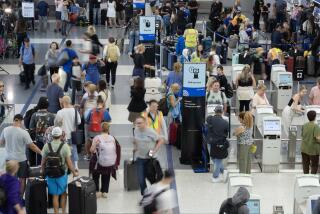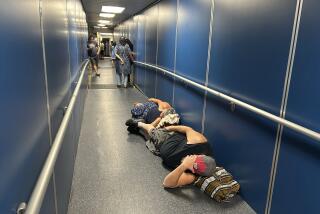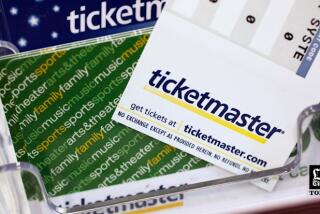Weighing Paper Against an E-Ticket Plane Ride
- Share via
Bad news: Your flight has been delayed or canceled, like the thousands of flights this summer that have been scrubbed amid labor strife at United Airlines or delayed by Midwestern storms or held up by some undisclosed vagary of our nation’s air traffic control system. But you hold no ticket in your hand.
You have booked an electronic ticket. And now, facing the prospect of finding another flight, you wonder: Am I better off than those travelers with old-fashioned tickets? Or worse?
The airlines say there’s no meaningful difference for the typical leisure traveler. But some people think differently.
“You’re never going to be worse off with a paper ticket,” said Terry Trippler, a longtime travel agent and air fare expert for the Web site 1travel.com. “Sometimes it may be even [between those with e-tickets and those with paper tickets]. But you’re going to be better off, at times, with a paper ticket.”
Ed Perkins, an ombudsman for the American Society of Travel Agents, chooses paper tickets over e-tickets whenever his route might mean changing airlines.
Trying to understand the advantages and disadvantages of electronically issued tickets is a demanding task. But now is a fine time for it because the practice is still growing and because different kinds of tickets give you different options in case of flight delays and cancellations--in a year that has been rife with them.
Electronic ticketing began conquering the airline industry in the early 1990s. It saves airlines the cost of printing and delivering tickets, and it’s convenient for travelers, who don’t have to wait for the tickets to arrive or worry about losing them. Though customers can request paper tickets at no extra charge, most have followed the carriers’ e-ticket encouragement.
United Airlines, which sold its first e-tickets in 1994, reports that e-tickets make up about 60% of its sales. Other major carriers have made similar transitions.
Because your reservation is stored in the airline’s computerized records, you need only appear at the airport on your day of travel and show photo identification (and perhaps, if asked, the credit card you used to secure the reservation). You can’t lose your ticket, you don’t need to wait for somebody to deliver it and, if you need to make changes before your travel date, you can do so by phone. Once you’re at the airport with your ID, the gate agent can issue you a boarding pass.
But there are catches. If the computers crash while you’re in the check-in line, holders of paper tickets may get boarding passes while e-ticket travelers are delayed. If a reservation agent finds that your booking has unaccountably vanished, an e-ticket traveler may have only a confirmation number, while a paper-ticket holder has a document that airlines are bound to honor.
These are relatively rare occurrences. The biggest question about e-tickets is this: If your flight is delayed or canceled, the best way out may be to book a flight with a different carrier, so what kind of ticket works best?
It’s usually a tie, said United spokesman Kurt Ebenhoch. But as Trippler points out, paper tickets never lose out, unless you lose them.
Nine of the 10 major airlines (Southwest is the exception) will accept each other’s paper tickets when circumstances force re-bookings. (If you change to a Southwest flight but are already ticketed on another carrier, you must request a refund from the first carrier and buy a new ticket from Southwest.)
If you have an unrestricted paper ticket, agents said, it is easily transferred to another carrier. But if you have an unrestricted e-ticket, you’ll need to get a paper ticket, then take it to your second choice--which could cost you time.
Most leisure travelers, however, buy less costly restricted tickets. To change carriers after a delay or cancellation, travelers on restricted fares typically must get a paper ticket, get the first airline’s endorsement on it, then present it to the second airline.
Consumers who arrive at the airport with paper tickets sometimes can head directly to the second carrier’s desk, and the second carrier’s gate agent will get endorsements by telephone from the first carrier, Trippler said.
Delays and cancellations have been epidemic at United this summer, partly because of a labor dispute with pilots that has forced the airline to cancel in advance 3% of its scheduled departures in September and October. Many other flights have been canceled on shorter notice.
Spokesman Ebenhoch said that because United is still flying more than 90% of its flights, it can accommodate most of its rescheduled customers on United flights. Changing carriers after a United cancellation or delay, you’ll probably need an endorsement from a United gate agent, with any restricted ticket. In most cases, Ebenhoch said, e-ticket holders are on even footing with paper-ticket holders.
To avoid cancellations and delays, Perkins and Trippler offer these tips:
* Book flights with early departures; delays tend to increase as the day wears on. If you have connecting flights, don’t settle for the “legal minimum” connecting time (usually about an hour for domestic flights). Give yourself an extra half-hour or hour.
* Before leaving for the airport, find out your flight’s status.
* Arrive at the airport knowing your options if something does go wrong--the next two flights to your destination, for instance.
* It also helps to know what the airline is required to do for you. If you find that staffing or weather problems have forced a delay or cancellation, the airline’s legal responsibility is fairly limited. For instance, under the language in United’s “contract of carriage,” the carrier’s only responsibility is to refund any unused part of your ticket if you decide to cancel your trip. Though they often seek to find seats for frustrated travelers, airlines are not required to do so.
*
Christopher Reynolds welcomes comments and suggestions, but cannot respond individually to letters and calls. Write Travel Insider, L.A. Times, 202 W. 1st St., Los Angeles, CA 90012, or send e-mail to chris.reynolds@latimes.com.
More to Read
Sign up for The Wild
We’ll help you find the best places to hike, bike and run, as well as the perfect silent spots for meditation and yoga.
You may occasionally receive promotional content from the Los Angeles Times.







